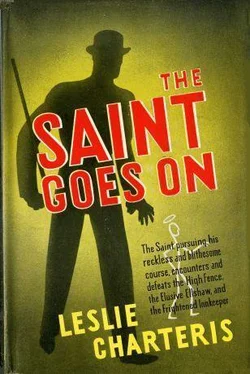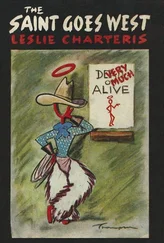Only one thing required no explanation; and he knew that Patricia Holm knew it, by this time, as well as he knew it himself — although her recital had carefully told him nothing more than Simon Templar himself would have done.
"The Saint was after the High Fence," he said bluntly. "He robbed Enderby this afternoon. I know it, and you know it, even if it is quite true that Enderby got on to us shortly after the alarm and swore it was all a mistake. Therefore it's obvious that Enderby is something to do with the High Fence. Maybe we can't prove it; but the High Fence knows his own men. It doesn't take much more to work out what happened."
"I think you're jumping to a lot of conclusions," said Patricia, with Saintly sweetness, and did not deceive him for an instant.
"Perhaps I am," he said stolidly. "But I know what I'd have done if I'd been the High Fence. I'd have heard what had happened as soon as Scotland Yard did; and I'd have watched this place. I'd have seen Pryke come in; and even that mightn't have stopped me… They left here in a taxi, did they? Well, you ought to be able to work it out as well as I can."
"You mean de High Fence puts de arm on him?" asked Mr. Uniatz, translating innuendo into an idiom that he could understand.
Teal looked round at him with heavy-lidded eyes in which the perpetual boredom was as flimsy a sham as anyone was likely to see it.
"If you know the answers, I expect you'll go to work on them," he said, with a stony significance of which he would have been the first to disclaim all knowledge. "I've got my own job to do. If one of you keeps in touch with this address, I'll let you know if I find out anything."
He left a roomful of equally stony silence behind him, and went out to take a taxi to Scotland Yard.
The High Fence had got the Saint and Junior Inspector Pryke — he had no doubts about that. He knew, although he could never prove it, that his analysis of the situation had been as mathematically accurate as any jig-saw he would ever put together could hope to be. And it was easier to put together than most problems. He would have been happier if his own course of action had been no less clearly indicated; and it disturbed him more than he could have cared to admit to realise that he was far more concerned about the fate of the Saint than he was about the fate of his own smug subordinate.
This secondary concern, however, was settled shortly after ten o'clock, when a police constable observed a pair of feet protruding from a bush on the edge of Wimbledon Common, and used the feet to haul out the body of a man. In the first flush of instinctive optimism, the policeman thought that the body was dead, and pictured himself (with photograph and biographical note) in the headlines of a sensational murder mystery; but closer investigation showed it to be alive, and with medical assistance it was quite easily resuscitated into a healthy profane Junior Inspector of unmistakable Trenchard parentage.
"So the High Fence didn't kill you," said Mr. Teal malignantly, when a police car had brought the salvage to Scotland Yard.
"I thought you'd be pleased," retorted Pryke pettishly.
He had a sick headache from the gas which had been pumped into the cab, and he was on the defensive for trouble. Mr. Teal did not disappoint him.
"Who told you to arrest the Saint?" he inquired mucilaginously, when Pryke had given his account of the affair.
"I didn't know I had to be told. I heard of the robbery at Enderby's, and there were grounds for believing that the Saint had a hand in it."
"You know that Enderby has denied that there ever was a robbery, and said it was entirely a misunderstanding?"
"Has he? That's what the Saint told me, but I didn't believe him. I knew nothing about it. I went out as soon as I received the first information, and waited for him at his flat."
"And you had to use a gun to arrest him."
Pryke flushed. He had thought it wiser to say nothing about that.
"He refused to come with me," he said sulkily. "I had to do something, and I didn't want to make a scene."
"It would have made the biggest scene you're ever likely to be in, if you had got him to the station and that gun had been mentioned in the police court," Teal said caustically. "As it is, you'll be on the carpet first thing in the morning. Or will you tell the Assistant Commissioner that all this was my idea, too?"
Pryke scowled, and said nothing.
"Anyhow," Teal wound up, "the Saint has got to be found now. After your performance, he's technically an escaped prisoner. Since it was your arrest, you'd better do something about it."
"What do you suggest?" asked Pryke, with treacherous humility.
Teal, having no answer, glared at him. Everything that could be prescribed for such an emergency had been done already — every alarm issued, every feeler put out, every net spread. If he could have thought of anything more, Chief Inspector Teal would have done it himself. But there was nothing to guide him: even what had been done was a mere firing of routine shots in the dark. The taxi had disappeared, and no one had even noticed its number. Beyond any doubt, the man who had ordered its movements was the same man who had killed Johnny Anworth and Sunny Jim Fasson — who, unless something were done quickly, would be just as likely to kill Simon Templar. A man knew too much, and he died: the logical sequence was quite clearly established, but Teal found no pleasure in following it to its conclusion.
"Since you're so damned independent of orders and regulations," he said, with excessive violence, "you might pay some attention to this man Enderby. I know he swears that the whole thing was a mistake, but I've heard of plenty of those mistakes before. There's no evidence and nothing we can charge him with, but if those stones that were stolen weren't stolen property already, I'll eat my hat. And if Enderby isn't hand in glove with the High Fence, even if he isn't the High Fence himself, I'll eat yours as well."
Pryke shook his head.
"I don't know that I agree. Fasson was shot as he was running out of Abbot's Yard, and when we made a house-to-house inquiry we found out that Templar had a place there under one of his aliases—"
"Well, what about it? I've never believed that the Saint didn't have something to do with it. I don't believe he killed Fasson; but I do believe that he got the body away from the flat where Fasson was shot, and that Fasson wasn't dead. I believe that he made Fasson talk; and that Fasson wasn't really killed until either the Saint let him go, or he ran away. I think Fasson told him something that made him go after Enderby, and"
Pryke shook his head again, with an increase of confidence and patronising self-satisfaction that made Teal stop short with his gorge rising under the leaven of undutiful thoughts of murder.
"I think you're wrong," he said.
"Oh, I am, am I?" said Mr. Teal malevolently. "Well, what's the right answer?"
The smug shaking of Junior Inspector Pryke's head continued until Teal could have kicked him.
"I have a theory of my own," he said, "which I'd like to work on — unless you've got something definite that you want me to do."
"You go ahead and work on it," replied Teal blisteringly. "When I want something definite done, I shan't ask you. In another minute you'll be telling me that the Assistant Commissioner is the High Fence."
The other stood up, smoothing down the points of his waistcoat. In spite of the situation for which he was responsible, his uncrushable superciliousness was reviving outwardly untouched; but Teal saw that underneath it he was hot and simmering.
"That wouldn't be so wild as some of your guesses," he said mysteriously. "I'd like to get the Saint — if anyone can be made a Chief Inspector for failing to catch him, they'd have to make a Superintendent of anyone who did it."
Читать дальше












